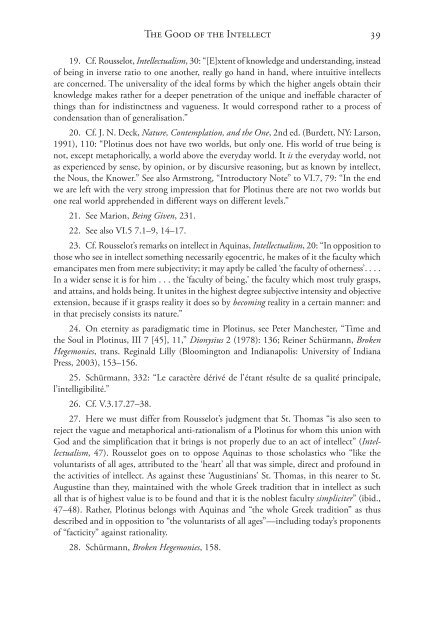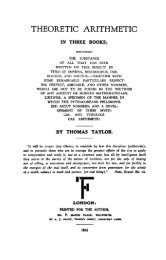Perl - The Good of the Intellect.pdf - Platonic Philosophy
Perl - The Good of the Intellect.pdf - Platonic Philosophy
Perl - The Good of the Intellect.pdf - Platonic Philosophy
Create successful ePaper yourself
Turn your PDF publications into a flip-book with our unique Google optimized e-Paper software.
<strong>The</strong> <strong>Good</strong> <strong>of</strong> <strong>the</strong> <strong>Intellect</strong> 39<br />
19. Cf. Rousselot, <strong>Intellect</strong>ualism, 30: “[E]xtent <strong>of</strong> knowledge and understanding, instead<br />
<strong>of</strong> being in inverse ratio to one ano<strong>the</strong>r, really go hand in hand, where intuitive intellects<br />
are concerned. <strong>The</strong> universality <strong>of</strong> <strong>the</strong> ideal forms by which <strong>the</strong> higher angels obtain <strong>the</strong>ir<br />
knowledge makes ra<strong>the</strong>r for a deeper penetration <strong>of</strong> <strong>the</strong> unique and ineffable character <strong>of</strong><br />
things than for indistinctness and vagueness. It would correspond ra<strong>the</strong>r to a process <strong>of</strong><br />
condensation than <strong>of</strong> generalisation.”<br />
20. Cf. J. N. Deck, Nature, Contemplation, and <strong>the</strong> One, 2nd ed. (Burdett, NY: Larson,<br />
1991), 110: “Plotinus does not have two worlds, but only one. His world <strong>of</strong> true being is<br />
not, except metaphorically, a world above <strong>the</strong> everyday world. It is <strong>the</strong> everyday world, not<br />
as experienced by sense, by opinion, or by discursive reasoning, but as known by intellect,<br />
<strong>the</strong> Nous, <strong>the</strong> Knower.” See also Armstrong, “Introductory Note” to VI.7, 79: “In <strong>the</strong> end<br />
we are left with <strong>the</strong> very strong impression that for Plotinus <strong>the</strong>re are not two worlds but<br />
one real world apprehended in different ways on different levels.”<br />
21. See Marion, Being Given, 231.<br />
22. See also VI.5 7.1–9, 14–17.<br />
23. Cf. Rousselot’s remarks on intellect in Aquinas, <strong>Intellect</strong>ualism, 20: “In opposition to<br />
those who see in intellect something necessarily egocentric, he makes <strong>of</strong> it <strong>the</strong> faculty which<br />
emancipates men from mere subjectivity; it may aptly be called ‘<strong>the</strong> faculty <strong>of</strong> o<strong>the</strong>rness’. . . .<br />
In a wider sense it is for him . . . <strong>the</strong> ‘faculty <strong>of</strong> being,’ <strong>the</strong> faculty which most truly grasps,<br />
and attains, and holds being. It unites in <strong>the</strong> highest degree subjective intensity and objective<br />
extension, because if it grasps reality it does so by becoming reality in a certain manner: and<br />
in that precisely consists its nature.”<br />
24. On eternity as paradigmatic time in Plotinus, see Peter Manchester, “Time and<br />
<strong>the</strong> Soul in Plotinus, III 7 [45], 11,” Dionysius 2 (1978): 136; Reiner Schürmann, Broken<br />
Hegemonies, trans. Reginald Lilly (Bloomington and Indianapolis: University <strong>of</strong> Indiana<br />
Press, 2003), 153–156.<br />
25. Schürmann, 332: “Le caractère dérivé de l’étant résulte de sa qualité principale,<br />
l’intelligibilité.”<br />
26. Cf. V.3.17.27–38.<br />
27. Here we must differ from Rousselot’s judgment that St. Thomas “is also seen to<br />
reject <strong>the</strong> vague and metaphorical anti-rationalism <strong>of</strong> a Plotinus for whom this union with<br />
God and <strong>the</strong> simplification that it brings is not properly due to an act <strong>of</strong> intellect” (<strong>Intellect</strong>ualism,<br />
47). Rousselot goes on to oppose Aquinas to those scholastics who “like <strong>the</strong><br />
voluntarists <strong>of</strong> all ages, attributed to <strong>the</strong> ‘heart’ all that was simple, direct and pr<strong>of</strong>ound in<br />
<strong>the</strong> activities <strong>of</strong> intellect. As against <strong>the</strong>se ‘Augustinians’ St. Thomas, in this nearer to St.<br />
Augustine than <strong>the</strong>y, maintained with <strong>the</strong> whole Greek tradition that in intellect as such<br />
all that is <strong>of</strong> highest value is to be found and that it is <strong>the</strong> noblest faculty simpliciter” (ibid.,<br />
47–48). Ra<strong>the</strong>r, Plotinus belongs with Aquinas and “<strong>the</strong> whole Greek tradition” as thus<br />
described and in opposition to “<strong>the</strong> voluntarists <strong>of</strong> all ages”—including today’s proponents<br />
<strong>of</strong> “facticity” against rationality.<br />
28. Schürmann, Broken Hegemonies, 158.
















